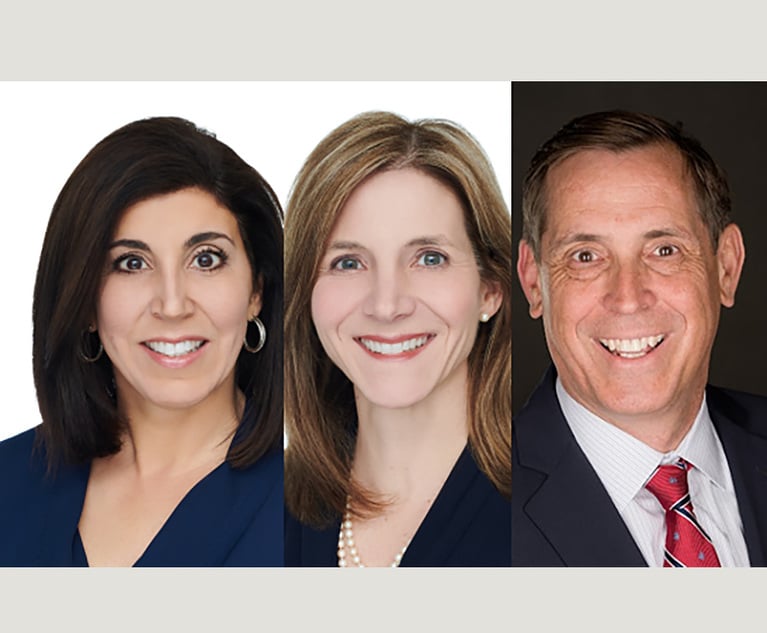Washington Wrap: ABA Report Reveals DC Lawyers’ Premier Perch
Washington, D.C., has one lawyer for every 13 residents, and they're some of the best-paid attorneys in the country.
August 16, 2019 at 01:57 PM
4 minute read
 Washington, D.C. (Photo: Fotolia)
Washington, D.C. (Photo: Fotolia)
Washington Wrap is a weekly look at industry news and Big Law moves shaping the legal business in Washington, D.C. Send news tips and lateral moves to Ryan Lovelace at [email protected].
The American Bar Association’s new report profiling the legal profession revealed what separates Washington, D.C., legal business from the rest of the country: the omnipresence of lawyers in the capital and the premier wages they collect.
According to the ABA, there is one lawyer for every 13 residents in D.C. Despite having a total population smaller than Alaska, the nation’s capital boasts more lawyers—56,000—than all but five states. And there is little reason to think the D.C. legal community will not keep growing.
Lawyers do not materialize in D.C. by spontaneous generation, but come for a variety of reasons—not the least of which is the high-paying work. Lawyers in D.C. make more on average than lawyers in any metropolitan area outside of northern California. According to the ABA, D.C.-metropolitan area lawyers’ average wage is $179,980, which exceeds both the Los Angeles metropolitan area, $176,020, the Houston metropolitan area, $175,380, and the New York metropolitan area, $172,020.
Wage growth for lawyers has slowed somewhat nationwide in recent years, but taking a longer view, it has swelled dramatically over the past two decades. Between 1998 and 2018, the ABA’s report found, lawyers’ salaries nationwide almost doubled.
Younger lawyers have benefited immensely in recent years from the competition among top firms to pay top wages for burgeoning talent. The ABA found that the median salary for first-year associates rose $20,000 from 2017 to 2019. Much of that growth could be traced to a small handful of cities—including D.C.—and was largely attributable to changes at firms with more than 700 lawyers.
Midsize law firm associates have not seen wage growth comparable to their Big Law competitors, as reported earlier this year in a study conducted by the National Association for Law Placement.
The new crop of associates arriving fresh from law school also carries a debt burden their mentors did not. Between 2000 and 2016, the average law student debt rose 77%, according to the ABA’s report. The uptick in law student debt since the turn of the century was far surpassed by medical students and Ph.D students, however.
The most recent data is a bit more promising—the average cumulative law student debt shrunk by about $4,000 between 2012 and 2016. The ABA noted that the U.S. Department of Education is next expected to release new data on student debt in 2020, which will provide a better picture of whether that decrease is indicative of a pattern or not.
Law Firm Moves, News & Notes
The Legal Services Corp. announced it is handing out $4.3 million worth of “pro bono innovation grants” for projects supporting low-income clients.
D.C. and Virginia received more than $500,000 of the grants.
George Mason University’s Antonin Scalia Law School announced this week that it hired Peter Davidson as its first deputy dean for strategic initiatives.
Davidson was previously general counsel to the U.S. Department of Commerce. Before joining the Commerce Department in 2017, he was senior vice president of federal and international relations for Verizon Communications.
President Donald Trump announced a new slate of judicial nominees this week, including several with ties to the D.C. legal community:
Steven Menashi was nominated to be a judge on the U.S. Court of Appeals for the Second Circuit. He is an associate counsel to the president and has worked in the White House since 2018, after a stint as acting general counsel at the Department of Education. He previously taught at George Mason’s Scalia Law School.
Sarah Pitlyk was nominated to be a judge on the U.S. District Court for the Eastern District of Missouri. She is a special counsel at the Thomas More Society, and was previously an associate at Covington & Burling in D.C.
Richard Myers was nominated to be a judge on the U.S. District Court for the Eastern District of North Carolina. Myers teaches at the University of North Carolina School of Law, was previously a lawyer at O’Melveny & Myers, and was formerly a law clerk to Judge David Sentelle on the U.S. Court of Appeals for the D.C. Circuit.
Steffen Johnson left the partnership of Winston & Strawn after 14 years. He was co-leader of the firm’s national appellate and critical motions practice.
This content has been archived. It is available through our partners, LexisNexis® and Bloomberg Law.
To view this content, please continue to their sites.
Not a Lexis Subscriber?
Subscribe Now
Not a Bloomberg Law Subscriber?
Subscribe Now
NOT FOR REPRINT
© 2025 ALM Global, LLC, All Rights Reserved. Request academic re-use from www.copyright.com. All other uses, submit a request to [email protected]. For more information visit Asset & Logo Licensing.
You Might Like
View All
Fenwick and Baker & Hostetler Add DC Partners, as Venable and Brownstein Hire Policy Advisers
2 minute read
Signaling Growth Goals, Some Law Firms Promote Record Partner Classes

Legal Departments Dinged for Acquiescing to Rate Hikes That 'Defy Gravity'
4 minute read
DC's Birchstone Moore Combines With Chicago-Founded Wealth Planning Firm
3 minute readTrending Stories
- 16-48. It’s Comp Time Again: How To Crush Your Comp Memo
- 2'Religious Discrimination'?: 4th Circuit Revives Challenge to Employer Vaccine Mandate
- 3Fight Over Amicus-Funding Disclosure Surfaces in Google Play Appeal
- 4The Power of Student Prior Knowledge in Legal Education
- 5Chicago Cubs' IP Claim to Continue Against Wrigley View Rooftop, Judge Rules
Who Got The Work
Michael G. Bongiorno, Andrew Scott Dulberg and Elizabeth E. Driscoll from Wilmer Cutler Pickering Hale and Dorr have stepped in to represent Symbotic Inc., an A.I.-enabled technology platform that focuses on increasing supply chain efficiency, and other defendants in a pending shareholder derivative lawsuit. The case, filed Oct. 2 in Massachusetts District Court by the Brown Law Firm on behalf of Stephen Austen, accuses certain officers and directors of misleading investors in regard to Symbotic's potential for margin growth by failing to disclose that the company was not equipped to timely deploy its systems or manage expenses through project delays. The case, assigned to U.S. District Judge Nathaniel M. Gorton, is 1:24-cv-12522, Austen v. Cohen et al.
Who Got The Work
Edmund Polubinski and Marie Killmond of Davis Polk & Wardwell have entered appearances for data platform software development company MongoDB and other defendants in a pending shareholder derivative lawsuit. The action, filed Oct. 7 in New York Southern District Court by the Brown Law Firm, accuses the company's directors and/or officers of falsely expressing confidence in the company’s restructuring of its sales incentive plan and downplaying the severity of decreases in its upfront commitments. The case is 1:24-cv-07594, Roy v. Ittycheria et al.
Who Got The Work
Amy O. Bruchs and Kurt F. Ellison of Michael Best & Friedrich have entered appearances for Epic Systems Corp. in a pending employment discrimination lawsuit. The suit was filed Sept. 7 in Wisconsin Western District Court by Levine Eisberner LLC and Siri & Glimstad on behalf of a project manager who claims that he was wrongfully terminated after applying for a religious exemption to the defendant's COVID-19 vaccine mandate. The case, assigned to U.S. Magistrate Judge Anita Marie Boor, is 3:24-cv-00630, Secker, Nathan v. Epic Systems Corporation.
Who Got The Work
David X. Sullivan, Thomas J. Finn and Gregory A. Hall from McCarter & English have entered appearances for Sunrun Installation Services in a pending civil rights lawsuit. The complaint was filed Sept. 4 in Connecticut District Court by attorney Robert M. Berke on behalf of former employee George Edward Steins, who was arrested and charged with employing an unregistered home improvement salesperson. The complaint alleges that had Sunrun informed the Connecticut Department of Consumer Protection that the plaintiff's employment had ended in 2017 and that he no longer held Sunrun's home improvement contractor license, he would not have been hit with charges, which were dismissed in May 2024. The case, assigned to U.S. District Judge Jeffrey A. Meyer, is 3:24-cv-01423, Steins v. Sunrun, Inc. et al.
Who Got The Work
Greenberg Traurig shareholder Joshua L. Raskin has entered an appearance for boohoo.com UK Ltd. in a pending patent infringement lawsuit. The suit, filed Sept. 3 in Texas Eastern District Court by Rozier Hardt McDonough on behalf of Alto Dynamics, asserts five patents related to an online shopping platform. The case, assigned to U.S. District Judge Rodney Gilstrap, is 2:24-cv-00719, Alto Dynamics, LLC v. boohoo.com UK Limited.
Featured Firms
Law Offices of Gary Martin Hays & Associates, P.C.
(470) 294-1674
Law Offices of Mark E. Salomone
(857) 444-6468
Smith & Hassler
(713) 739-1250










